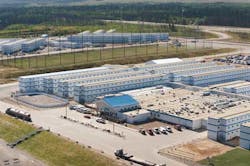What the frac is a man camp?
PTI's Athabasca Beaver Lodge north of Fort McMurray, AlbertaPhotos courtesy of PTI Group
Christina Lyons, Vorys, Sater, Seymour and Pease LLP, Houston
EDITOR'S NOTE: Certain petroleum-producing regions of the US and Canada are enjoying an economic boom due to drilling and development activities in shale, oil sands, and other unconventional resource plays. In some rural communities and remote areas, housing accommodations must be constructed for workers due to lack of available places for them to live. In this article, Christina Lyons, an attorney who has served as a liaison between housing developers and local officials in several of these areas, discusses some of the considerations that must be taken into account. |
Man camps. What exactly are they? This is the same question currently being posed by state, city, and county officials in booming oil towns across the United States and in Canada.
Man camps provide temporary employee housing to oilfield workers and have increased in number due to influxes in population coupled with housing shortages in remote drilling areas.
Man camp accommodations can range from recreational vehicles and barracks-style modulars to luxury lodge accommodations.
These camps are intended to be self-sufficient "communities." The camps not only provide shelter for the transient oilfield worker but also dining, laundry, and recreational facilities.
Owned by management companies, the oil companies typically pay a daily rate per employee for residency at the camp, and, depending on the employment arrangement, the oil company may require employees to be responsible for a certain portion of the cost.
Although these man camps provide solutions for the oil companies and their employees with respect to housing shortages, they sometimes bring with them a host of problems for the rural communities in which they are constructed. With an overwhelming influx in population, problems arise with safety and sanitation. The increase in population places strains on interior roads, electricity and water providers, law enforcement agencies, emergency services, fire protection, and sewage disposal. A once idyllic pasture can become cluttered with metal compounds and rodents.
Many oil companies have set up company policies that forbid alcohol, illegal drugs, firearms, and unauthorized women. Rowdiness is controlled not only by background checks of employees but also by working the employees long hours so that each day is like "Groundhog Day" – work, eat, sleep – leaving little time for shenanigans. However, these company policies do little to stifle the strain on community resources and local infrastructure.
In an attempt to minimize the strain on local resources and regulate the camps, which typically do not fit the definition of a mobile home or recreational vehicle park, local officials are trying to define the term "man camp." They are doing so by ordinance. Through such ordinances, local officials hope to place regulations on the construction and running of man camps.
The ordinances attempt regulation of man camps in different ways. Most ordinance proposals institute fees per occupant as well as special-use fees. These fees can then be used to support local law enforcement, fire personnel and emergency services. Permitting has become a hot-button issue with many officials requesting that companies apply for special land-use permits that require an appearance at a public hearing, most likely before a zoning commission and county commissioners.
By requiring the companies to speak in a public forum, the accountability of the oil companies is increased due to reputation concerns surrounding promises and statements made to the local communities.
Oil States opens new oil sands lodge
Houston-based Oil States International Inc. (NYSE: OIS), through its Canadian subsidiary PTI Group Inc., has opened a new Canadian Lodge, Anzac Lodge, located south of Fort McMurray in the Athabasca oil sands region of Alberta, Canada. PTI designed, built, owns, and manages the new lodge, which has an initial capacity of 338 rooms. The lodge began operations in January of 2013.
Construction of Anzac Lodge is backed by an initial one-year contract for the majority of the initial capacity in support of in-situ operations. Longer term, Anzac Lodge will support in-situ operations in the southern oil sands play along with pipeline infrastructure expansions.
Anzac provides PTI's full suite of first-class accommodations and services including catering, ancillary and convenience services, internet service, conference rooms, and leisure facilities for fitness, entertainment, and relaxation.
"[The new lodge] supports our customers' growing accommodation needs," said Cindy B. Taylor, president and CEO of Oil States. "Anzac is our seventh major lodge in the oil sands region and provides us with greater exposure to in-situ development and pipeline infrastructure expansions in a growing area of concentrated customer activity."
Oil States International is a diversified oilfield services company and a provider of remote site accommodations with prominent market positions in the Canadian oil sands and the Australian mining regions. Oil States also manufactures products for deepwater production facilities and subsea pipelines, and is also a provider of completion-related rental tools, oil country tubular goods distribution, and land drilling services to the oil and gas industry.
In an attempt to preserve the tranquility and safety of the communities, other ordinances require that man camps be located at a specified distance from residential and commercial areas. Furthermore, some go so far as to regulate the distance between the individual man camps themselves. This again is an attempt to minimize safety and sanitation concerns.
Because man camps are a result of housing shortages at drilling sites, many officials are requiring that the oil companies actually demonstrate a severe housing shortage with a lack of alternatives such as motels and rental homes. This is to ensure that the man camp is essential and the company is supporting the community financially when possible.
Sanitation can be a big concern. Without water and sewage treatment facilities, many camps must transport sewage for disposal to larger cities which may be miles away. Because of the distance, time, and money, transport for disposal is typically a scheduled event. This can lead to rodent and pest problems not normally seen in the areas. Officials hope to change this sanitation issue by requiring, among other things, waste treatment facilities onsite, portable toilets, and water testing.
The construction and running of man camps are not the only issues. Once drilling in the area has stopped, some camps have simply been abandoned by the oil companies leaving a metal ghost town in its wake. In an attempt to thwart such abandonment, regulations are being proposed that require companies to deposit a bond to cover any cleanup costs should the camp close unexpectedly or be abandoned. Additionally, fines can be imposed for violating the ordinance. The goal is to ensure that the boom does not turn into a bust and the land can be reclaimed.
Many locals view the oil companies and employees as "guests" of the community. Local ordinances are an attempt to make sure the companies and employees remain in favor of their host towns so that they will be invited back.
The ordinances can also be viewed positively by the oil companies. Without such ordinances, the companies may face moratoriums in certain areas in which the community has been maxed out on services. That being said, others remain resistant to the regulation of an industry which historically has been uncensored and unregulated. Only time will tell as to what extent, and to what degree, the drilling boom and its unique issues will be regulated.
About the author
This article was prepared by Christina Lyons, a partner in the law firm of Vorys, Sater, Seymour and Pease LLP. A recent transplant to the Houston office from the firm's home office in Columbus, Ohio, she has been assisting both Ohio and Texas clients in establishing the recent phenomenon of man camps. As a transactional attorney, her practice is concentrated on corporate and finance law.



